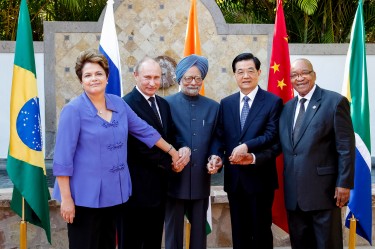China’s and Russia’s recent decision to veto the United Nations Security Council resolution against Syria -has reignited debate over the relationship between ‘new’ powers like Brazil, Russia, India, China and South Africa – the BRICS – with ‘old’ powers like the North Atlantic Treaty Organization (NATO) in international interventions.

The BRICS conference held last March provides the backdrop for Oliver Stuenkel’s article in The Hindu that foresaw Russia’s and China’s decision to veto the UN Resolution on Syria for a third time:
“…There seemed to have been consensus in the case of Libya in February and March 2011. Yet already during the war, the BRICS have rightly argued that North Atlantic Treaty Organisation (NATO) forces exceeded the U.N. mandate given to them. Resolution 1973 was “to protect civilians and civilian populated areas under threat of attack,” yet NATO regarded it as a permission to bring upon regime change. As a consequence, the BRICS are now suspicious of any resolution regarding Syria.”
On the other side of the table, the BRICS position has sparked much criticism among the ‘old’ powers. Daniel Korski, an adviser to the EU High Representative for Foreign Affairs and Security Policy, wrote that one could expect a gridlocked world in 2012:
“And though NATO Allies succeeded in Libya both diplomatically and militarily, China and Russia have managed to block decisive action against Syria, despite its government’s violent crackdown on protesters. Dealing with Iran, an issue of major concern to NATO Allies, also requires the support of China, Russia and India.”
Intervene or not intervene?
Both cases in Syria and Libya are controversial. In fact, they demonstrate that ‘old’ and ‘new’ powers have different approaches on how to deal with conflicts and there are different opinions to back those positions. Alex Thurston, a PhD student in the Religion Department at Northwestern University, Illinois, considers that ‘NATO’s Intervention in Libya Was a Mistake’ in his blog sahelblog:
“While the civil war would have produced some chaos regardless, I think the chances are strong that without the Western intervention, Colonel Muammar Qaddafi’s side would have defeated the rebels and Qaddafi would have remained in power, an outcome that would have reduced the resulting regional chaos.”
World War II heritage
Countries with a historical tradition of intervening in regional affairs blame ‘new’ powers for not acting in the name of human rights. ‘New’ powers argue that intervention does more harm than good. All countries generally act in their own self-interest though. In fact, while China and other countries boost their economies through their economic ties, last year, US expenditure in defense exceeded $700 billion, the highest since the Second World War according to Time. Brazilian journalist Pepe Escobar calls the insistence of the ‘West” to intervene in Syria, “The ‘hell cost’ of the NATO’s Holy War” [Pt]:
“And while the “West” flirts with the ‘Holy War’, the Chinese state owned companies crazily buy goods from the entire Middle East, North of Africa and South America – in addition to expanding its stock of rare natural resources within strategic reserves …”
The role of NATO in the current world order – in which the bi-polar world divided between the US and former Soviet Union has been replaced by a multipolar international system – changes things according to Hans Christof von Sponeck, the former UN Assistant Secretary General:
“(NATO’s) mandate, grounded in the 1949 North Atlantic Treaty, originally dealt with the defense of its member states. At the end of the Cold War, in 1989, its mandate appeared to have been fulfilled. Nevertheless, the NATO members wanted to maintain this Western alliance. This launched the search for a new role for NATO.”
For further information on the topic, please view the following publications from our partners:
Ten Years of BRIC Life, from the Chatham House, London, United Kingdom.
BRICS: Opportunities and Challenges, from the Institute for Defence Studies and Analyses (IDSA), New Delhi, India.
From BRIC to BRICS: Developments in the Cooperation of Emerging Economies, from Polish Institute of International Affairs (PISM), Warsaw, Poland.
For more information on issues and events that shape our world please visit the ISN’s Security Watch and Editorial Plan Dossiers.

